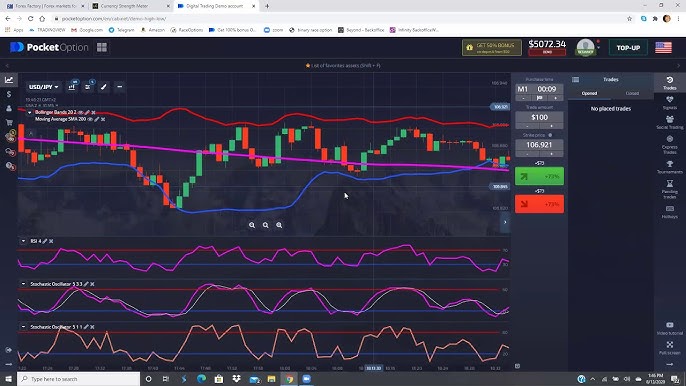
Online Trading in India: A Comprehensive Overview
Online trading in India has transformed the investment landscape, offering numerous opportunities for individuals seeking to grow their wealth. With the advent of technology and internet penetration, the ability to trade stocks, commodities, currencies, and cryptocurrencies from the comfort of one’s home has become a reality. Platforms like Online Trading in India Pocket Option online trading have made it easier for even novice traders to participate in this dynamic environment.
Understanding Online Trading
Online trading refers to the buying and selling of financial instruments via internet-based trading platforms. In India, this practice has gained immense popularity over the last decade, spurred by factors such as increased access to the internet, user-friendly trading platforms, and a growing interest in personal finance and investment.
The Growth of Online Trading in India
India’s online trading market has seen exponential growth in recent years. The introduction of dematerialized accounts (demat accounts) by the National Securities Depository Limited (NSDL) in 1996 laid the foundation for digital trading. These accounts allowed investors to hold securities in electronic form, drastically reducing the need for physical share certificates.
Furthermore, with over 700 million internet users in India, online trading has become accessible to a large segment of the population. This accessibility has made it the preferred choice for many investors, particularly among the younger generation.
Benefits of Online Trading
1. **Convenience**: Online trading allows investors to buy and sell financial assets at any time, from anywhere. This level of convenience is unmatched by traditional trading methods.
2. **Lower Costs**: Online trading platforms often have lower commission fees compared to traditional brokers, making it more cost-effective for investors.
3. **Diverse Investment Options**: Investors can access a wide range of financial instruments, including stocks, bonds, mutual funds, exchange-traded funds (ETFs), and derivatives.
4. **Instant Execution**: Trades can be executed almost instantly, allowing traders to capitalize on market movements rapidly.
5. **Educational Resources**: Many online trading platforms provide educational materials, webinars, and tools that can help novice traders learn the ins and outs of trading.
Popular Online Trading Platforms in India
There are several online trading platforms available in India that cater to different investor needs. Some of the most popular include:
- Zerodha: One of the largest discount brokers in India, known for its user-friendly interface and low brokerage fees.
- Upstox: Offers competitive pricing and a robust trading platform, catering primarily to retail investors.
- Angel Broking: Provides a wide array of services, including portfolio management and research support.
- ICICI Direct: A part of ICICI Bank, it offers comprehensive services and a user-friendly trading platform.
- HDFC Securities: Known for its reliable customer service and powerful trading tools.

Risks of Online Trading
While online trading presents numerous benefits, it is essential for investors to be aware of the associated risks:
1. **Market Volatility**: Stock prices can fluctuate wildly based on news, earnings reports, or economic shifts, potentially leading to significant losses.
2. **Leverage Risks**: Many online trading platforms offer leverage, allowing traders to control larger sums of money. However, this can magnify losses just as it can amplify gains.
3. **Lack of Regulation**: Not all online trading platforms are well-regulated. Investors must ensure they choose platforms that adhere to regulatory standards to avoid scams.
4. **Emotional Trading**: The ease of instant trading can lead to impulsive decisions based on emotions rather than sound investment strategies.
Strategies for Successful Online Trading
To navigate the challenges of online trading successfully, investors should consider several strategies:
1. **Educate Yourself**: Knowledge is power. Utilize the educational resources available on trading platforms to understand market trends and trading strategies.
2. **Set Clear Goals**: Define your investment objectives, such as long-term growth, short-term profits, or income generation, to tailor your trading approach accordingly.
3. **Start Small**: New traders should begin with small investments to minimize risk and build confidence before committing more substantial sums.
4. **Diversify Your Portfolio**: Spreading investments across various sectors and asset classes can reduce overall risks and enhance the potential for returns.
5. **Utilize Stop-Loss Orders**: Setting stop-loss orders can help limit potential losses by automatically selling a security when it reaches a certain price.
Future of Online Trading in India
The future of online trading in India looks promising. As technology continues to evolve, investors can expect even more advanced trading tools, AI-driven insights, and automated trading options. Additionally, regulatory changes may further enhance the safety and security of online trading, instilling confidence among investors.
Furthermore, India’s growing economy and increasing financial literacy among young people are likely to propel the online trading market to new heights. As more individuals seek to take control of their financial destinies, online trading will continue to play a crucial role in the nation’s investment landscape.
Conclusion
Online trading in India represents a significant opportunity for individuals to invest and grow their wealth. While it comes with its own set of challenges and risks, the benefits far outweigh them when approached with diligence and education. By leveraging the available resources and employing sound trading strategies, investors can navigate this dynamic environment successfully and potentially achieve their financial goals.


Deja Un Comentario